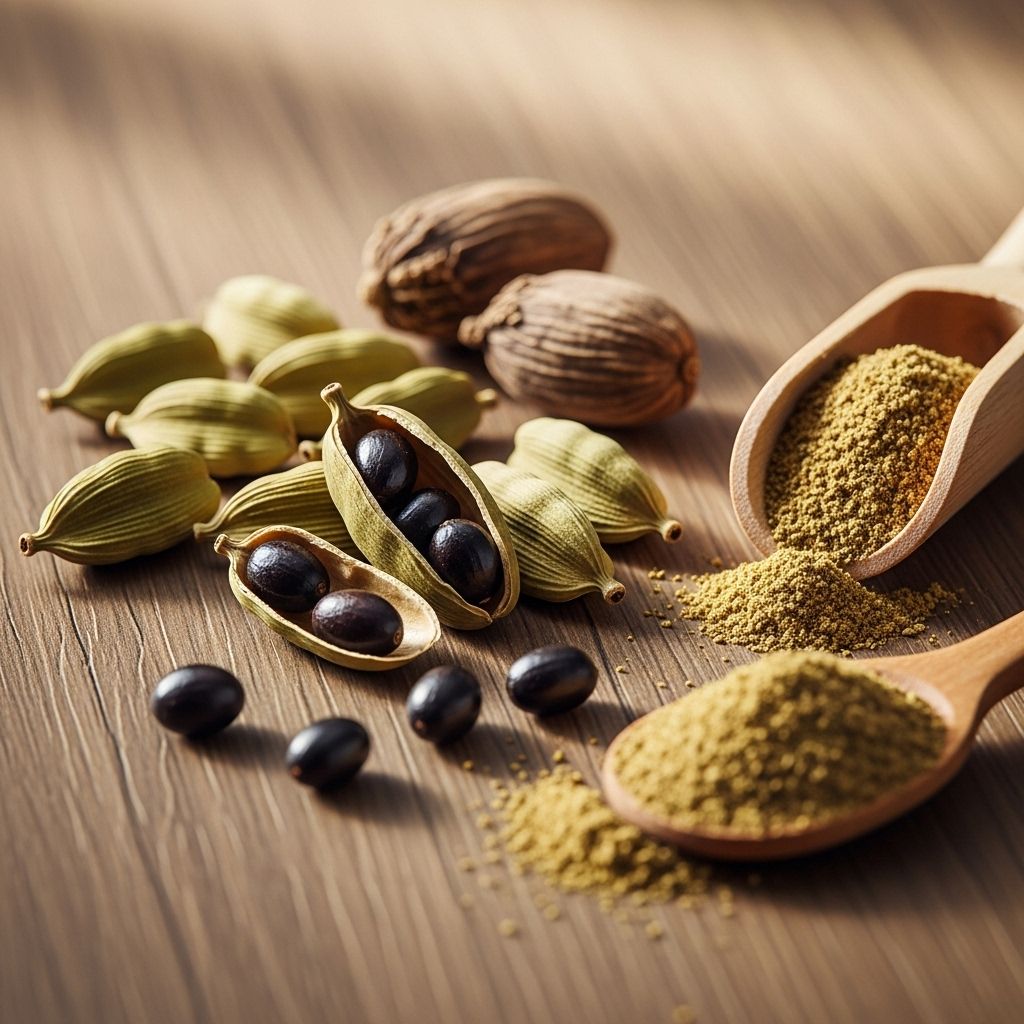13 Evidence-Based Health Benefits Of Cardamom
A flavorful spice that nourishes your body with antioxidant power and digestive harmony.

13 Proven Health Benefits Of Cardamom
Cardamom—often hailed as the ‘Queen of Spices’—is more than just a flavorful addition to dishes and desserts. This aromatic spice, native to India and widely used across the globe, offers a plethora of health benefits that are backed by emerging scientific research. From managing blood pressure to supporting gut health, cardamom has found its place not only in culinary traditions but also in wellness and preventive health care.
Table Of Contents
- What Is Cardamom?
- Nutritional Profile Of Cardamom
- 13 Science-Backed Health Benefits
- Potential Side Effects
- Selection And Storage Tips
- How To Use Cardamom
- Frequently Asked Questions
What Is Cardamom?
Cardamom is a spice made from the seeds of various plants in the genera Elettaria and Amomum in the family Zingiberaceae. The two main types are:
- Green cardamom (Elettaria cardamomum): Often used in sweet and savory recipes worldwide.
- Black cardamom (Amomum subulatum): Has a more smoky, intense flavor, primarily used in savory dishes and traditional medicine.
The spice is valued for its distinct aroma—a blend of eucalyptus, mint, and pepper—and is often referred to as the “Queen of Spices” due to its culinary prestige and health benefits.
Nutritional Profile Of Cardamom
Though used in small quantities, cardamom is packed with nutrients and bioactive compounds. Here’s a quick nutrition breakdown per 100 grams of cardamom pods:
| Nutrient | Amount |
|---|---|
| Calories | 311 kcal |
| Protein | 10.76 g |
| Fat | 6.7 g |
| Carbohydrates | 68.47 g |
| Dietary Fiber | 28.0 g |
| Calcium | 383 mg |
| Magnesium | 229 mg |
| Potassium | 1119 mg |
| Iron | 13.97 mg |
| Phosphorus | 178 mg |
Cardamom is also a rich source of antioxidant phytochemicals, volatile oils, and minerals essential for health.
13 Science-Backed Health Benefits Of Cardamom
1. May Help Lower Blood Pressure
Several clinical studies reveal that cardamom possesses antioxidant and diuretic properties that may help people with high blood pressure. In a 12-week study, daily intake of cardamom powder reduced blood pressure to normal levels in newly diagnosed hypertensive adults. Researchers attribute this effect to increased urination and improved antioxidant status, which helps regulate heart function and vascular resistance.
2. Packed With Antioxidant Power
Cardamom is abundant in antioxidants—substances that counter oxidative stress and protect cells from free-radical damage. These compounds may help lower the risk of chronic diseases and slow aging. Studies show supplementation with cardamom significantly increases antioxidant status, reducing inflammation-induced cell damage.
3. May Possess Cancer-Fighting Compounds
Preclinical research indicates that compounds in cardamom may help fight certain cancers. In animal and in vitro studies, cardamom powder and extracts showed the ability to enhance detoxifying enzymes, boost natural killer cell activity, and slow tumor growth. For example, cardamom supplementation in mice reduced skin and oral cancer development. While human trials are still lacking, these findings are promising.
4. Fights Chronic Inflammation
Chronic, low-grade inflammation is linked to many modern diseases. Cardamom is rich in anti-inflammatory phytochemicals, which may lower inflammatory markers and protect cells from inflammatory damage. Animal studies show cardamom extract reduces liver inflammation and effectively inhibits multiple inflammatory pathways.
5. Supports Digestive Health And Relieves Indigestion
Traditionally used to relieve digestive discomfort, cardamom may help with indigestion, nausea, bloating, gas, and cramping. The spice stimulates the secretion of digestive enzymes, relaxes gut muscles, and may aid in protection against ulcers. Cardamom’s essential oils—such as cineole and limonene—impart carminative properties that soothe and relieve the gut.
6. May Enhance Oral Health
Chewing cardamom serves as a natural breath freshener. Its antibacterial properties help fight bacteria linked to oral infections, cavities, and bad breath. Besides neutralizing odors, cardamom may alter oral pH and boost saliva production to protect against dental problems.
7. Promotes Weight Control And Fat Loss
Recent studies demonstrate that cardamom consumption increases energy expenditure and enhances the fat-burning process, even while increasing appetite. Research found that regular intake modulates nerve circuits controlling fat metabolism, promoting loss of body fat while preserving lean mass. Some evidence suggests that eating 8 to 10 cardamom pods daily may be beneficial for adults wanting to maintain a healthy weight.
8. May Support Healthy Blood Sugar Levels
Cardamom’s antioxidant content helps counter oxidative stress—a major contributor to diabetes. The spice may also improve insulin sensitivity, support glucose metabolism, and lower the risk of type 2 diabetes. However, further clinical research is needed for definitive claims.
9. Benefits Heart Health
Cardamom’s blood pressure-lowering, antioxidant, and anti-inflammatory properties combine to support cardiovascular health. By minimizing risk factors like hypertension and oxidative damage, cardamom may lower the risk of heart attacks and strokes.
10. May Help Manage Respiratory Disorders
Used in Ayurveda and traditional medicine for cough, asthma, and bronchitis, cardamom’s expectorant action helps relieve respiratory discomfort and ease breathing. Its essential oils can dilate bronchial passageways and promote airflow.
11. Can Elevate Mood And Relieve Stress
Cardamom’s unique aroma is attributed to compounds like cineole and limonene, which may help lift mood and relieve mental fatigue. Its adaptogenic properties make cardamom a popular ingredient in herbal teas to reduce anxiety and stress.
12. May Protect Liver Function
Animal studies show cardamom reduces markers of liver inflammation and protects against fatty liver induced by high-fat diets. The spice scavenges toxins and promotes the breakdown of fat, aiding overall liver function.
13. May Have Antimicrobial Effects
Cardamom oil and extracts display broad-spectrum antimicrobial activity against common bacteria and fungi. Regular use of cardamom can help prevent infections and protect overall health.
Potential Side Effects Of Cardamom
Cardamom is considered safe for most people when used in amounts typically found in foods. However, there are some considerations:
- Consuming excessive amounts may cause digestive issues in some individuals.
- People with gallstones should avoid concentrated supplements, as cardamom may trigger pain.
- Allergic reactions are rare, but possible in sensitive individuals.
Always consult your healthcare provider before using herbal supplements, especially if you are pregnant, nursing, or on medications.
Selection And Storage Tips
- Whole pods preserve flavor and aroma better than ground cardamom. Buy pods whenever possible.
- Keep cardamom in an airtight container, away from light, heat, and moisture.
- Freshly grind seeds for optimal fragrance and potency.
- Store ground cardamom in small quantities and use it quickly, as it loses flavor rapidly.
How To Use Cardamom
Cardamom’s deliciously complex flavor shines in both sweet and savory dishes. Here are popular culinary and wellness uses:
- Brewed in teas, coffees, and chai blends.
- Used in baking (cakes, cookies, breads).
- Flavoring for rice dishes, curries, and stews.
- Infused in desserts (rice pudding, kheer, puddings).
- Chewed as a natural breath freshener after meals.
- Added to herbal blends for digestive health.
For a unique twist, try adding crushed cardamom pods to smoothies, yogurt, or healthy energy balls.
Frequently Asked Questions (FAQs)
Q: How much cardamom should I consume per day?
A: Recent research suggests adults may benefit from the bioactives in about 8–10 whole cardamom pods daily. However, start with small amounts and consult your healthcare provider if you have health concerns.
Q: Can cardamom help with weight loss?
A: Yes, studies indicate that cardamom may help increase energy expenditure, promote fat loss, and reduce body weight, especially as part of a healthy diet and lifestyle.
Q: Is it safe to consume cardamom during pregnancy?
A: Cardamom is generally safe in culinary amounts during pregnancy. However, avoid supplements or large medicinal doses without consulting a healthcare provider.
Q: Is cardamom good for diabetes?
A: Cardamom may help improve blood sugar regulation and insulin sensitivity, but more studies are needed to confirm these effects in humans.
Q: Can cardamom be bad for you?
A: Cardamom is very safe when taken in normal food quantities. Rarely, extremely high intake could cause digestive discomfort or allergic reactions.
Takeaway
From antioxidant protection to improved metabolism and digestive comfort, cardamom is a time-honored spice with powerful health-promoting properties. Enjoy it as part of a balanced, varied diet for its flavor and wellness benefits.
References
- https://agrilifetoday.tamu.edu/2023/08/10/cardamom-study/
- https://www.healthline.com/nutrition/cardamom-benefits
- https://www.webmd.com/diet/health-benefits-cardamom
- https://pmc.ncbi.nlm.nih.gov/articles/PMC8467221/
- https://www.news-medical.net/news/20230813/Study-reveals-the-health-and-dietary-benefits-of-consuming-cardamom.aspx
- https://www.mccormickscienceinstitute.com/our-research/scientific-overviews/cardamom-potential-health-benefits
Read full bio of Sneha Tete












